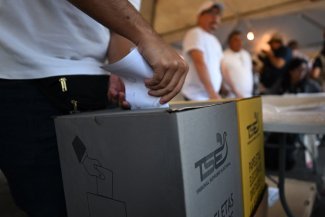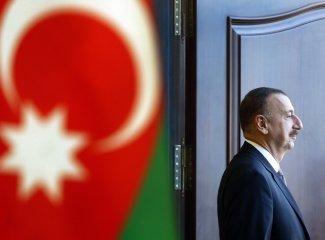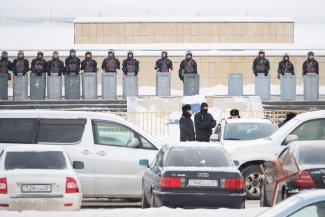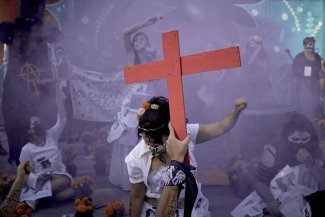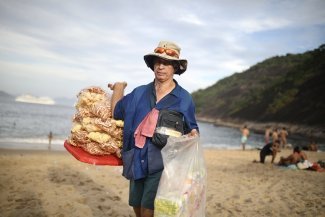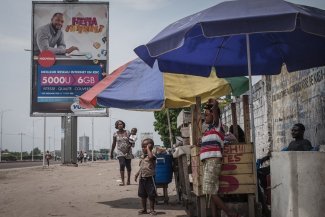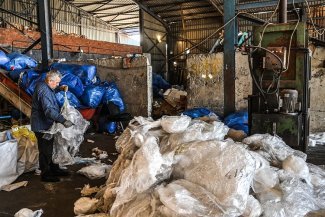
On 8 March 2024, activists demonstrate on International Women’s Day in downtown Baku, Azerbaijan. Their signs read: “No to early marriage, it’s child abuse”. “Fair wages for equal work” and “Journalism is a crime in Azerbaijan”.
On 8 March 2024, Azerbaijani trans and feminist activist Alex Shah posted a photo on X (formerly Twitter) of roughly 20 activists gathered in a square being filmed by several reporters and surrounded by masked police officers. Another activist sent a message to the media defending women’s rights, denouncing femicide and calling on the government to release imprisoned journalists and other political prisoners.
The rally marking International Women’s Day took place under tight surveillance. It was one of the few recent acts of protest in Azerbaijan. After succeeding his father – former Soviet dignitary Heydar Aliyev – in 2003, Ilham Aliyev now rules the hydrocarbon-rich South Caucasus republic of 10 million, which is roughly the size of Austria.
Azerbaijan has steadily slipped down the international rankings with regards to respecting democratic principles and freedom of expression over the last 20 years. Notably, Azerbaijan went from score 6 (in 2005) to 7 (in 2016), then considered the worst in the index concerning political rights and civil liberties established by the American NGO Freedom House, joining the category of repressive dictatorships such as Iran, Myanmar and North Korea. Since 2017, Azerbaijan has continued to fall in the Freedom House rankings, which adopted a new form of calculation, going from a score of 14 out of 100 to 7 out of 100, in 2024.
On 7 February 2024, Aliyev was re-elected for a fifth term as president with 92 per cent of the vote. Local and international observers reported numerous cases of fraud in the tightly controlled election.
Azerbaijan’s main opposition parties boycotted the election, while many dissidents are either in prison or in exile. Political repression, no recent phenomenon in the country, intensified in the months leading up to the election.
According to the Union for the Liberation of Political Prisoners of Azerbaijan (Azərbaycan Siyasi Məhbusların Azadlığı Uğrunda İttifaq), the number of political prisoners in the country rose from 80 to 253 between February and December 2023, and shows no signs of slowing down: the group’s latest count published in mid-March lists 288 names.
Political opposition and investigative journalists targeted
One notable figure imprisoned over the past year is economist Gubad Ibadoghlu, chairperson of the Azerbaijan Party for Democracy and Prosperity (Azərbaycan Demokratiya və Rifah Partiyası), who has been in pre-trial detention since last July despite serious health problems. He is accused by the courts of “printing, acquiring or selling counterfeit money” and “supporting religious extremism”. In February, his lawyer said that Ibadoghlu suffers from diabetes and heart problems, warning that without adequate treatment, he could soon fall into a coma.
In November, investigative journalists Sevinc Vaqifqizi and Ulvi Hasanli were arrested on charges of “plotting to smuggle foreign currency into the country”. Pressure has also been exerted on their relatives: “Our mothers are prevented from retrieving their sole income – their pensions – because their cards are blocked, while the bank accounts of our friends have been frozen, and they are banned from leaving the country,” writes Hasanli in an open letter to his daughter.
Vaqifqizi and Hasanli’s website Abzas Media has become the government’s bête noire by regularly publishing revelations about the regime’s corruption. One of their latest investigations concerns a torture scandal within the army. According to Amnesty International, cases of torture and ill-treatment remain widespread in Azerbaijan’s prisons.
Four other Abzas Media journalists were arrested prior to the election, along with a dozen media workers, lawyers, activists and opposition politicians. Several members of the Workers’ Bureau (İşçi Masası), a young independent trade union confederation which notably supported the motorbike delivery workers’ protest movement in 2022 and 2023, were also arrested.
“Activists are calling this a second major wave of repression, the first one having been in 2014. Not all critical voices are suppressed but every form of organised opposition is,” says Cesare Figari Barberis, a doctoral student at the Graduate Institute of International and Development Studies (IHEID) in Geneva and a specialist in the Caucasus. “The government has also embarked on a path of digital authoritarianism, for example by employing an army of trolls to harass dissident voices on the internet.”
A recent round of arrests in March targeted journalists from the YouTube channel Toplum TV and members of the III Respublika movement, a new liberal opposition platform that planned to put forward candidates for the 2025 parliamentary elections.
“In the past, the authorities prosecuted activists and members of civil society for illegal economic activities. Now they accuse them of smuggling foreign currency. The intention, however, remains the same: to suppress the last remaining critical voices in the country,” says Giorgi Gogia, associate director for Europe and Central Asia at the NGO Human Rights Watch.
This wave of repression paradoxically comes at a time when the regime has been relatively unchallenged and has even strengthened its legitimacy by taking complete control of the Armenian enclave of Nagorno-Karabakh, de facto independent since 1991, following military offensives in 2020 and 2023.
“Ilham Aliyev became even more repressive after the end of the Karabakh war. He was emboldened by his victory and no longer has any tolerance for political opposition or civil society,” explains activist Nil Mammadrzayeva.
The Aliyev government has also become more radical in its ideology in recent years. “The regime is more nationalistic and militaristic than it was in the past. It no longer has any restraint,” says political scientist Bahruz Samadov of Charles University in Prague.
This new paradigm is perfectly illustrated by the recently created Military Trophies Park in the capital city of Baku, where military equipment confiscated from Armenian forces is displayed, along with the helmets of slain enemy fighters and wax figures with caricatured features representing Armenian soldiers. A number of observers have described the displays as “dehumanising”.
A geostrategic position that strengthens the regime
Ilham Aliyev has been able to enjoy absolute power thanks to a combination of internal and external factors. Oil and gas revenues have gone into strengthening both the army and the police and the ensuing repression has decimated a political opposition that has never been able to offer a credible alternative. “The opposition has long been divided and plagued by major internal tensions. It has lacked a strategy since the end of the war and is taking a wait-and-see approach,” continues Samadov.
Internationally, the autocracy enjoys a unique geostrategic position. Azerbaijan is an ally of both Israel and the United States against neighbouring Iran, as well as the ‘sister nation’ of Erdoğan’s Turkey. Russia has also made Baku a privileged economic partner while abandoning Armenia.
Following the outbreak of war in Ukraine and the sanctions placed on Russia, the European Union signed an energy agreement with Aliyev for the supply of gas. This has further weakened the ability of European bodies to oppose Azerbaijan’s authoritarian drift.
“The EU has essentially legitimised the consolidation of Aliyev’s power,” says Barberis. “In response to the war of September 2023, which resulted in the ethnic cleansing of the Karabakh Armenians, the European Parliament adopted a non-binding resolution condemning Azerbaijan but the European Commission didn’t adopt any sanctions.”
In a display of Azerbaijan’s influence and privileged status on the international stage despite its flagrant human rights violations, Baku will host the UN’s annual international climate conference in November. This is part of a strategy of organising mega-events designed to strengthen the legitimacy of Aliyev’s rule. In addition to the upcoming COP29, Azerbaijan has also hosted the 2012 Eurovision Song Contest, the first European Games in 2015, and a Formula One racing event held since 2017. Faced with such consolidated influence and power, activists and pro-democracy forces hold out little hope for regime change.
The main cause of popular discontent is the country’s socio-economic situation, with high inflation and a stagnant GDP in 2023. Before the elections, a meme was widely circulated on social networks, juxtaposing an image of a dilapidated classroom in a town in the country’s south with a newly refurbished barn on a goat farm (which even features a piano) in Lachin, in the Nagorno-Karabakh region.
This juxtaposition was meant to illustrate the authorities’ abandonment of rural areas and the regime’s failure to redistribute oil and gas revenues for anything other than ideological projects. But the anger of a section of the population is unlikely to translate into collective mobilisation against the government.
“We shouldn’t expect the Azerbaijani people to overthrow Aliyev today or even five years from now. At this rate, he will hand over power to his son in a few years’ time,” laments Mahammad Mirzali, a young blogger who has been a refugee in France since 2016.
In his videos, Mirzali strongly criticises the regime’s highest-ranking officials. His opinions have made him the target of three assassination attempts on French soil and he now lives under police protection.
Although he holds no official position, Heydar Aliyev Jr was recently photographed in military uniform with his father visiting an air base where combat drones are stationed. The next presidential elections are due to be held in 2029, when Ilham Aliyev will be 67 and his son 30.



